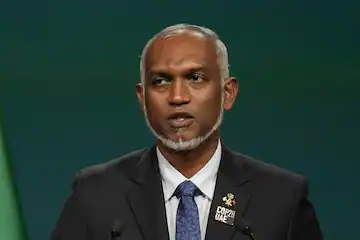News Desk, Kolkata : In a high-stakes political showdown that has gripped the Maldives, the stage was set for a crucial parliamentary vote on President Mohamed Muizzu’s 22-member cabinet. However, the political landscape took an unexpected turn when the main opposition party, the Maldivian Democratic Party (MDP), flexed its parliamentary muscle by withholding approval for four key cabinet members.
As the clock ticked toward the pivotal 1 pm vote on a Sunday, the MDP, in a dramatic parliamentary group meeting, unleashed a three-line red whip, signaling its decision to block approval for crucial cabinet members. Videos circulating on the internet depicted a tense scene as opposition MPs found themselves barred from entering the parliamentary floor ahead of the anticipated vote.
Adding another layer of complexity to the political chessboard, The Democrats, a recently allied opposition party, joined forces with the MDP by opting not to approve three ministers and explicitly withholding support for the foreign minister, Moosa Zameer. Together, these two opposition powerhouses commanded 56 out of 87 MPs, casting a shadow of uncertainty over the fate of the blacklisted ministers.
The political maneuvering intensified as the Government Oversight Committee, in a December session, had previously given the green light to the cabinet, ensuring all members met constitutional requirements. However, the ruling Progressive Party of Maldives (PPM) and People’s National Congress (PNC) coalition raised alarms, decrying the denial of approval as a deliberate attempt to cripple the functioning of the government.
This latest episode in the Maldivian political saga unfolded against the backdrop of heightened tensions between the government and opposition parties. Just a few days prior, the two main opposition parties had voiced serious concerns about the government’s perceived anti-India stance, characterizing New Delhi as a pivotal and longstanding ally.
The MDP and The Democrats minced no words, cautioning that alienating any development partner, especially the country’s most steadfast ally, India, would prove “extremely detrimental” to the Maldives’ long-term development. President Muizzu, known for his pro-China stance, had campaigned against India in the November elections, a fact that further fueled the flames of discontent among opposition ranks.
In a surprising twist, Muizzu had formally requested cabinet approval back in November, and the Parliament, initially scheduled to vote on December 18, witnessed a twist of fate. The Government Oversight Committee reconvened during recess on December 30, ultimately approving the cabinet. However, the political drama did not end there, setting the stage for the current impasse.
As the opposition flexes its parliamentary muscle and the ruling coalition cries foul, the Maldives finds itself at a critical juncture, teetering on the edge of political uncertainty. President Muizzu’s recent visit to Beijing to upgrade bilateral ties with China adds an additional layer of complexity to the geopolitical dynamics, leaving observers to ponder the delicate balance between alliances and the potential ramifications for the island nation’s future.
Analysts suggest that the standoff reflects not only the deep-seated divisions within the Maldivian political landscape but also the shifting geopolitical currents that have become increasingly intertwined with domestic politics. The opposition’s strategic move to block key cabinet members underscores their determination to wield influence and assert their vision for the country’s trajectory.
The coming days are likely to be marked by intense negotiations, backroom dealings, and a war of words between the government and opposition forces. The outcome of this political standoff could shape the direction of the Maldives for years to come, influencing not only its domestic policies but also its geopolitical alliances on the global stage.
As the Maldives grapples with this political maelstrom, the eyes of the international community remain fixed on the tiny island nation, acutely aware that the decisions made in the coming days may reverberate far beyond its shores. The delicate dance between regional powers, internal politics, and the aspirations of the Maldivian people hangs in the balance, leaving an uncertain path ahead for this picturesque archipelago in the Indian Ocean.
DISCLAIMER
Our news media denounces any form of bias and disapproves of sensationalism. The disseminated news is entirely educational and aimed at social awareness. Our media maintains absolute impartiality, adhering solely to the purpose of education and social consciousness.


